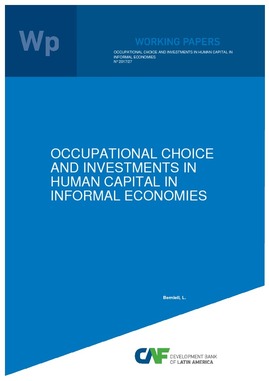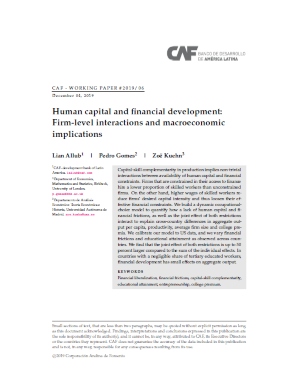Occupational Choice and Investments in Human Capital in Informal Economies
Abstract
Countries di er greatly in their levels of schooling and also in their rates of entrepreneurship. At the same time, the share of the so-called \shadow economy" -informal economic activities- is very large in some countries and very small in others. This paper explores some key channels that connect these three phenomena. In particular, it focuses on assessing whether the extent to which rms can hide from tax authorities -i.e., operate in the informal economy- may a ect the incentives of individuals to invest in human capital and also distort their occupational choices.
The cross country data shows that the levels of educational attainment, rates of entrepreneurship and the level of informality are connected. First, across countries there is a positive association between rates of entrepreneurship and the sizes of the informal sector. Second, the di erence in the skill premium received by entrepreneurs and workers is negligible for economies with low levels of informality, while it becomes positive and increasing for more informal economies. Third, in more informal economies the fraction of high-skilled individuals that choose to become entrepreneurs is larger. Moreover, the share of the labor force that is skilled and the size of the informal economy are related in a non-linear way: for low levels of informality the share of skilled individuals rst decreases but then it rapidly stabilizes for countries with su ciently large informal sectors.
Subject
Country / Region
Date
2017-12-12Cite this publication
Belongs to collection
Items Relacionados
Human Capital and Financial Development: Firm-Level Interactions and Macroeconomic Implications
Capital-skill complementarity in production implies non-trivial interactions between availability of human capital and financial constraints. Firms that ...
Skills and selection into teaching: Evidence from Latin America
This paper documents a novel stylized fact: many teachers in Latin America have very low levels of cognitive skills. This skills deficit is the result ...
N° 23. Socio-Economic Determinants of Financial Education. Evidence for Bolivia, Colombia, Ecuador and Peru
Evidence about the determinants of financial education is hard to come by at a global scale and is mostly limited to developed countries. In 2013, CAF ...





